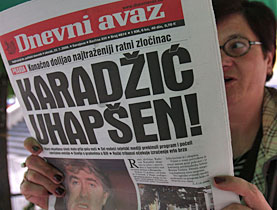
Karadzic arrest seen as a step towards justice

The detention earlier this week of former Bosnian Serb leader Radovan Karadzic after more than 12 years on the run was welcome news in many parts of the world.
For the people who suffered under his regime, his arrest has far greater significance.
The Serb government, secret service and police said he had gone into hiding and was untraceable, while Karadzic lived and worked unrecognised by the general public.
Survivors, western governments and Balkan experts labelled Karadzic a mass murderer, responsible for the deaths of tens of thousands of people and the traumatisation of hundreds of thousands of others.
Karadzic, alias Dr Dragan David Dabic, had his own alternative healing practice, handed out business cards and had his own email address.
“It makes us bitter to know that he could move around freely in Serbia during all these years,” Jasmina Pasalic, the Bosnia Herzegovina ambassador to Switzerland, told swissinfo.
Swift action
She praised the new Serbian government for its swift action. “That is certainly helpful in developing bilateral relations between Belgrade and Sarajevo.”
Pasalic is convinced that the arrest of Karadzic will have a stabilising influence on the whole region. “It is a step towards justice.”
Osman Besic has been in Switzerland since 1990 and is head of the health division at the Swiss Red Cross Society. Besic, who studied as a political scientist and social worker, did not personally experience the wartime atrocities of the early 1990s.
But as is the case for most Bosnians, members of his family were victims of the regime of Karadzic and his general Ratko Mladic, who is still in hiding.
“There are still deep wounds. I spent my youth in Bosnia, my identity was forged there, I was shaped there. And then someone destroyed it. It feels as though a part of you has been wiped out.”
Relieved
Besic felt relieved and liberated after Karadzic’s arrest. “I felt all the turmoil of the war period once again. That evening I looked for a long time at Serbian, Bosnian and Croatian television broadcasters.
The feeling of agitation lasted several days after the arrest. “The surprise over his reappearance is still there. The original emotions are still with me but no longer as intense as they were.
“Everything that had been achieved by Bosnian society was ruined by Karadzic’s ideology of an enlarged Serbia.”
Besic makes the point that before the war Bosnia was known as a place where despite ethnical and religious differences people lived in peace.
“We had the largest number of mixed marriages in the Yugoslavia of that time,” commented Besic.
Not important
“Once a year we were asked in school which ethnic group we belonged to. Many didn’t know and it wasn’t important.”
This achievement, which was linked to trust and the forging of an identity, was destroyed in the war. “We built this up together, not one single group of people.”
And so most could not understand it when Bosnia moved in the nationalist direction promoted by Karadzic.
“We probably reacted too late because we were all in shock. Even when the tanks came to Bosnia I never believed there would be war.”
“I associate the name Karadzic with a manipulative and murderous potential to drive out others for the sake of a large inheritance.”
Power and money
“It is extremely important for Bosnia to single out people like Karadzic and Mladic so that it clearly emerges that they provoked the disaster with their criminal plans,” Besic said.
Behind that there were also power and financial interests, he said.
“I believe that the forthcoming trial will make it clear to many people on the Serbian side that they did not fight for an enlarged Serbia but for people who are today rich or in power.”
Besic feels that leaders like Karadzic have to be brought to account so as to come to terms with the past.
He is convinced that the wounds inflicted by the massacre in Srebrenica or in Serbian concentration camps cannot be healed by trials. The emotional strains are so strong that they cannot be healed from one day to the next.
“I think only life can change that situation. For many that process has started already because new generations are growing up. Fifteen years have now gone by and a new perspective on it all has to be sought.”
swissinfo, Etienne Strebel
The war in Bosnia-Herzegovina raged from 1992 to 1995. It took the lives of about 100,000 people.
After the break-up of the republic of Yugoslavia, large parts of the Serb population of Bosnia and Herzegovina wanted closer ties to Serbia, many Croats wanted the same to Croatia and Bosnians wanted their own state.
Tensions escalated in March 1992 after the independence of the republic of Bosnia and Herzegovina and the proclamation of a Bosnian-Serb republic were declared.
So-called ethnic cleansing ended in armed conflict among all three large ethnic groups.
The Bosnian Serbs, strongly supported militarily by the Serbia of Slobodan Milosevic, soon controlled 70% of the territory of Bosnia and Herzegovina.
International mediation efforts and the deployment of United Nations troops could not contain the war for a long time.
After the Serbian side was forced on the defensive in 1995, the warring parties held negotiations that brought about the Dayton Agreement, putting an end to the conflict.
Under the terms of the agreement Bosnia and Herzegovina, Croatia and the Federal Republic of Yugoslavia agreed to fully respect the sovereign equality of one another and to settle disputes by peaceful means.

In compliance with the JTI standards
More: SWI swissinfo.ch certified by the Journalism Trust Initiative




























You can find an overview of ongoing debates with our journalists here . Please join us!
If you want to start a conversation about a topic raised in this article or want to report factual errors, email us at english@swissinfo.ch.